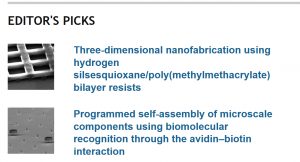News
Dane awarded NASA Space Technology Research Fellowship
Congrats to Andrew Dane, Graduate Research Assistant in the QNN group, was awarded a NASA Space Technology Research Fellowship, class of 2014. His research topic is “Superconducting Nanowire Single Photon Detectors for High-Data-Rate Deep-Space Optical Communication.”
The goal of NSTRF is to sponsor U.S. citizen and permanent resident graduate students who show significant potential to contribute to NASA’s goal of creating innovative new space technologies for our Nation’s science, exploration and economic future. NASA Space Technology Fellows will perform innovative, space-technology research at their respective campuses and at NASA Centers and/or at nonprofit U.S. Research and Development (R&D) laboratories. Awards are made in the form of training grants to accredited U.S. universities on behalf of individuals pursuing master’s or doctoral degrees, with the faculty advisor serving as the principal investigator.
New paper: “Eight-fold signal amplification of a superconducting nanowire single-photon detector using a multiple-avalanche architecture” accepted to Optics Express
[pdf] [abstract] Superconducting nanowire avalanche single-photon detectors (SNAPs) with n parallel nanowires are advantageous over single-nanowire detectors because their output signal amplitude scales linearly with n. However, the SNAP architecture has not been viably demonstrated for n > 4. To increase n for larger signal amplification, we designed a multi-stage, successive-avalanche architecture which used nanowires, connected via choke inductors in a binary-tree layout. We demonstrated an avalanche detector with n = 8 parallel nanowires and achieved eight-fold signal amplification, with a timing jitter of 54 ps.
The paper by Qingyuan Zhao, Adam N. McCaughan, Andrew E. Dane, Faraz Najafi, Francesco Bellei, Domenico De Fazio, Kristen A. Sunter, Yachin Ivry, and Karl K. Berggren has been accepted to Optics Express.
Prof. Berggren gives Feynman Lecture: Lithography and self-assembly below 10nm
Prof. Berggren’s recent talk on “Lithography and self-assembly below 10nm” was published as part of IOP’s Feynman Lectures 50th Anniversary Celebration Seminar Series. The talk outlines the QNN Group’s research efforts in charged-particle lithography and block copolymer self-assembly.
This is the first in a series of seminars on nanotechweb.org presented by leading researchers on key topics in nanotechnology. The series celebrates the 50th anniversary of the Feynman Lectures in Physics. For more seminars in this series keep an eye on IOP’s multimedia channel.
Recent Paper Editor’s Pick JVST B
Congrats to Adam and Sarah for Fellowship
Congrats to Adam McCaughan and Sarah Goodman both received NSF iQuise Training Fellowships for the coming year. Adam is continuing this fellowship, and Sarah is a new receipient.
